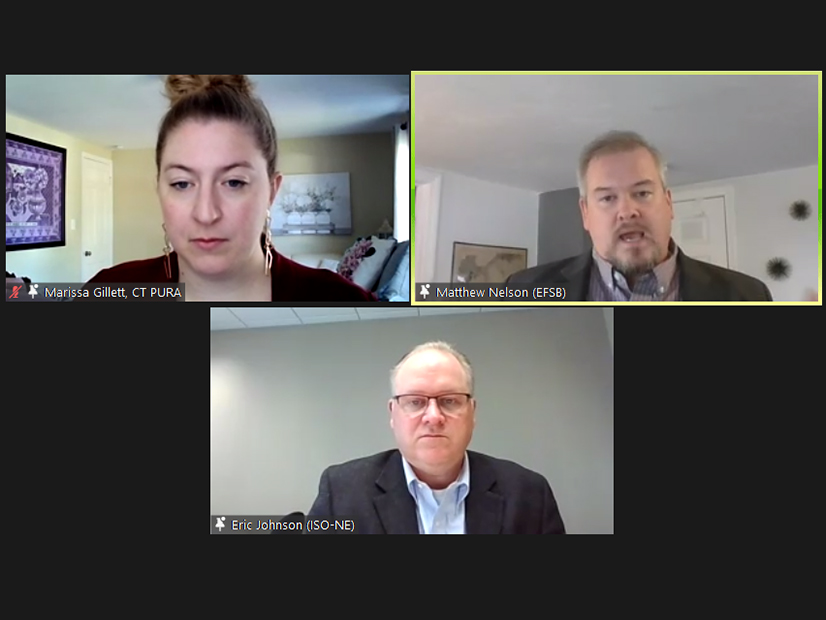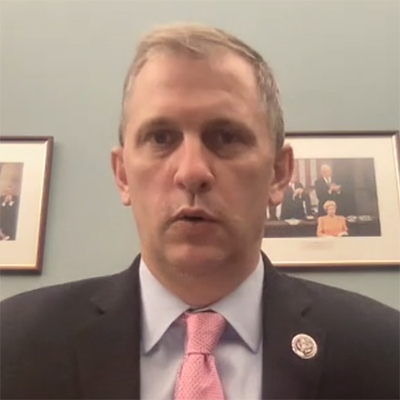
The Connecticut Power and Energy Society focused its annual fall conference on the theme of equity and inclusion as drivers of “the future of energy.”
“This is something that we thought was very important for us to do this year,” CPES President Alex Judd said.
Here is some of what we heard at the virtual event.
Casten Looks Beyond ‘Hot FERC Summer’
When U.S. Rep. Sean Casten (D-Ill.) went the pop culture reference route to draw attention to FERC on the House floor in July, he did not think “Hot FERC Summer,” a play on the Meghan Thee Stallion hit “Hot Girl Summer,” would be a defining moment for him.
“I must say it cracks me up to realize that I’ve still got a few years left in me, but I now know what they’re going to say on my tombstone, and it’s going to be ‘Hot FERC Summer,’” Casten said with a laugh during his closing keynote. “Whatever else I’ve done in my life, that one minute on the House floor seems to be the thing I’ll be remembered for.”
Zeitgeist and the #HotFERCSummer hashtag aside, Casten now reaches a broader constituency when he talks about energy issues, primarily through an equity and environmental justice lens. According to the UN’s Intergovernmental Panel on Climate Change report released in August, Casten said, “we’re out of time.” (See Too Late to Stop Climate Change, UN Report Says.)
 U.S. Rep. Sean Casten (D-Ill.) speaks at the Connecticut Power and Energy Society’s virtual fall conference on Thursday. | Connecticut Power and Energy Society
U.S. Rep. Sean Casten (D-Ill.) speaks at the Connecticut Power and Energy Society’s virtual fall conference on Thursday. | Connecticut Power and Energy Society“We don’t have time to move slowly, and the single worst thing we can do for equity is to ignore the fires and ignore the floods because this summer is not the new normal,” Casten said. “It is the rate of acceleration. That’s our new normal.”
Economy-wide decarbonization and electrification need to happen quickly, as does the doubling of energy efficiency. And likely without the billions of dollars in funds from the Build Back Better Act that House Democrats fear will look different when the Senate potentially trims back the bill.
“It’s a grand parlor game in Washington speculating what might emerge from the Senate,” Casten said.
Billions invested in clean energy and the transmission infrastructure to interconnect it, which “without any hyperbole” would be “the single greatest wealth transfer from energy producers to energy consumers that our species has ever seen,” Casten said.
“Every technology we deploy is cheaper to operate than the ones that it displaces, and it cuts the cost of energy, to the point that creates real problems for our grid regulators,” Casten said.
Part of the reason Casten talked about a “Hot FERC Summer” was the critical role he thought the agency would need to play in building a reliable power system.
He also added that the clean energy transition is an enormous economic growth opportunity, but there is a need to ensure that it does not widen wealth inequality.
“We need to talk about this more honestly in the energy community,” Casten said. “This is going to lead to a massive increase in labor productivity. That’s one way of putting it, but the other way is it doesn’t take as many people to run a solar panel.”
Helping communities previously built around and dependent upon fossil fuel extraction and production is something that Casten understands because Illinois “used to be a coal state.” He has “a certain sympathy” for Sen. Joe Manchin, the West Virginia Democrat who is opposed to some of the more robust climate change measures touted as vital by the Biden Administration and many Democrats in Congress like Casten.
“Geographically, West Virginia is a beautiful state. It’s also a really hard state [in which] to build electricity wires and to build highways and infrastructure … so there’s a lot of logic for a West Virginian economy that’s based on the natural resources in the ground,” Casten said. “But as we’ve moved away from coal, those jobs have gone away. It’s hard to see them coming back.”
Casten thinks “it’s unfortunate” that people in West Virginia do not have leaders who describe what they have seen “on the other side of the mountaintop” when it comes to clean energy.
“Instead, [it’s] leadership that’s telling them that they agree that this mountain is too high, why don’t we just all lie down here in the forest and cry,” Casten said.
Congress needs more experts in climate change and energy issues, Casten added. He is a former clean energy company CEO and has undergraduate and graduate degrees in engineering. Climate change is Casten’s top priority.
“I would ask you to bring your expertise with an uncomfortable level of ambition because if your message to Washington is, ‘I really like the status quo,’ that’s not particularly helpful,” Casten said.
Equity in the Regulatory Process
To decarbonize the transportation sector, states like Connecticut and Massachusetts need more electric vehicles on the road. During their panel, Matthew Nelson, chair of the Massachusetts Department of Public Utilities, and Marissa Gillett, chair of Connecticut’s Public Utilities Regulatory Authority, said that people in low- to moderate-income communities need ease and access to charging infrastructure.
“Electric vehicle charging isn’t like gas stations. You’re not just replacing the gas station. They have different use patterns,” Nelson said.
He added that while getting people into single-passenger EVs is laudable, the real goal is heavy-duty equipment and vehicles.
“I recently went to an onsite demonstration of an electric backhoe, and the two things that really jumped out to me is it functioned just as well as the regular gas-powered, and it was incredibly quiet. The societal benefit of having something that is not pumping out emissions that is quiet, other than the actual digging — it’s absolutely staggering the difference. There’s a lot of non-energy benefits that come from electrifying transportation fleets.”
Gillett said she is proud of the work PURA did on its nine-year electric vehicle charging program — part of the Equitable Modern Grid initiative — that set targets for the number of charging stations deployed in low- to moderate-income areas or underserved communities. However, she added there needs to be consideration of urban mobility options such as e-scooters and e-bikes. In addition, Uber and Lyft do a lot of “deadheading,” often polluting the air in environmental justice communities.
“There’s room for creative thinking here that I’m hoping is inspired on this day,” Gillett said. “We have a lot of folks that are advancing the electrification conversation. I’m hoping that some of our stakeholders pick up on that thread and start building on top of the work that’s already been done.”


